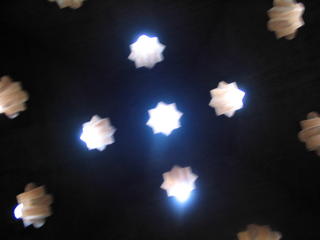Roits in France viewed from Belgium
The suburbs burning of hopelessness, by Mohsin Mouedden
(published in Centrum Voor Islam In Europa)
"France's suburbs are burning of hatred, but above all of hopelessness... Revolt has never have so much support ... after more than 11 days of revolts, the French Government still seems to be absent and powerless...
We forget that the sparkle of these revolts is the atrocious death of two young minors carbonised by a central EDF. The arrogant ideas of Minister Sarkozy as well as the gassing of the mosque Bilal (without official apology from the government) have done nothing more than pouring oil over fire.
The populist politics of security of the Minister of Home Affairs, Nicolas Sarkozy, based on fear of the "young", of the "immigrant", of "islamist" and of "terrorist" has not helped, even though Sarkozy is not the only one responsible of this apartheid policy...
The Minister shows an almost-surreal realism on some points (about the file of double penalty, he boosts also the positive discrimination and a less dogmatic secularism, even though it was the catalyse of the ban on the veil.)
Since the 1980s' "Don't touch my buddy" and the anti-racist demonstration of the socialists, the French people of immigrant origin living in the suburbs have seen their already poor living standard conclusively shattered in pieces.
Ghettoïsation, discrimination in employment, racism, locative and social apartheid. The suburbs have become disconnected blocks within France and her chimeric ideals of equality, liberty and fraternity..." (read more, in French only)
P.S. The translation into English is unofficial, of my sole responsibility.
Categories: Discrimination, Europe, Inequity, Poverty, Race,
(published in Centrum Voor Islam In Europa)
"France's suburbs are burning of hatred, but above all of hopelessness... Revolt has never have so much support ... after more than 11 days of revolts, the French Government still seems to be absent and powerless...
We forget that the sparkle of these revolts is the atrocious death of two young minors carbonised by a central EDF. The arrogant ideas of Minister Sarkozy as well as the gassing of the mosque Bilal (without official apology from the government) have done nothing more than pouring oil over fire.
The populist politics of security of the Minister of Home Affairs, Nicolas Sarkozy, based on fear of the "young", of the "immigrant", of "islamist" and of "terrorist" has not helped, even though Sarkozy is not the only one responsible of this apartheid policy...
The Minister shows an almost-surreal realism on some points (about the file of double penalty, he boosts also the positive discrimination and a less dogmatic secularism, even though it was the catalyse of the ban on the veil.)
Since the 1980s' "Don't touch my buddy" and the anti-racist demonstration of the socialists, the French people of immigrant origin living in the suburbs have seen their already poor living standard conclusively shattered in pieces.
Ghettoïsation, discrimination in employment, racism, locative and social apartheid. The suburbs have become disconnected blocks within France and her chimeric ideals of equality, liberty and fraternity..." (read more, in French only)
P.S. The translation into English is unofficial, of my sole responsibility.
Categories: Discrimination, Europe, Inequity, Poverty, Race,

